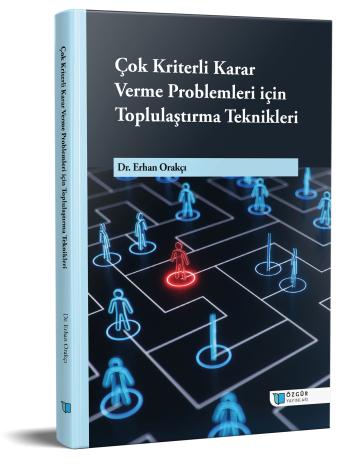
Çok Kriterli Karar Verme Problemleri İçin Toplulaştırma Teknikleri
İndir
Özet
Çok kriterli karar verme teknikleri farklı alanlarda ortaya çıkan problemlerin çözümünde kullanılmaktadır. Karşılaşılan karar problemleri seçim, sıralama ve sınıflama olmak üzere üç grupta toplanmaktadır. Bu üç farklı yapıdaki problemlerin çözümünde yararlanılabilecek çok sayıda çok kriterli karar verme tekniği bulunmaktadır. Ancak, bu tekniklerle elde edilen sonuçlar birbirinden farklılaşabilmektedir. Bu noktada hangi teknik ile elde edilen sonucun en iyi sonuç olduğu belirsizdir. Bu nedenle problemin yapısına uygun farklı çok kriterli karar verme teknikleri ile çözümler elde edilmesi ve son aşamada bu çözümlerin toplulaştırılmasıyla nihai bir çözüme ulaşılması gittikçe artan bir yaklaşımdır. Farklı çok kriterli karar verme teknikleriyle elde edilen çözümlerin toplulaştırılmasında kullanılan teknikler toplulaştırma teknikleri olarak adlandırılmaktadır. Bu çalışmada, sıralamaların toplulaştırılması amacıyla Referans Alternatif Temelli Toplulaştırma Tekniği (RAT) geliştirilmiştir.
RAT’ın temel amacı, bir problem için kullanılan farklı çok kriterli karar verme teknik sonuçlarının toplulaştırılmasıdır. RAT; kullanım kolaylığı, ek bir teknik veya puanlamaya ihtiyaç duymaması ve tam sıralama problemini büyük oranda ortadan kaldırması bakımından diğer toplulaştırma tekniklerinden farklılaşmaktadır. Analizler sonucunda RAT’ın, diğer toplulaştırma teknikleri ile %99,93 oranında uyumlu sonuçlar verdiği görülmüştür. Bununla beraber RAT ile sonuçların ortalama %1,2’sinde tam sıralama elde edilemediği, karşılaştırılan diğer tekniklerde ise bu oranının en az %82 olduğu görülmüştür.
RAT 830.000 örnek üzerinden uygulanmış ve sonuçlar Borda, Copeland, Dodgson ve Kemeny toplulaştırma teknikleriyle karşılaştırılmıştır. Bununla beraber daha önce toplulaştırma tekniklerinin kullanıldığı 21 çalışma RAT ile tekrar çözümlenmiş ve sonuçlar karşılaştırılmıştır.
RAT’ın çok kriterli karar verme alanına önemli katkılar sağlayacağı, sosyal tercihler ve grup karar verme gibi alanlarda da başarılı bir şekilde uygulanabileceği düşünülmektedir.

